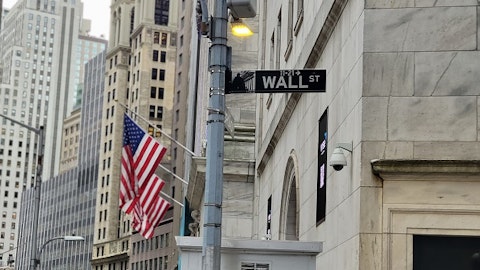Steve Delaney: Good morning, Mike, Andy and Frank. I appreciate the question. Excuse me. Distributable EPS estimate for the third quarter was $0.16. That was the low. It included based on your commentary on the second quarter call, it included an estimated realized loss of $11 million or $0.08 per share on the Oakland office loan. And I don’t want to get into like too much nitty-gritty accounting. But just to explain, practice had been, obviously, CECL reserves, whether specific or general have no impact on distributable EPS, but two things, I guess, could happen. You could sell a loan a loss that hits distributable EPS. You could just — with foreclosures, we understand that REO is carried at fair value. And generally, we have had an impact on distributable EPS, when alone with a specific reserve has been foreclosed upon.
And CECL reserve goes away, but we take a charge at that time. So I’m just curious, I guess, looking at distributable EPS, whether it’s the base or the adjusted, it’s $0.04 higher. Can you just Frank, talk about what impact there was, if any, on third quarter results on the foreclosure of the Oakland office building. Thank you. If I said hotel, apologies.
Frank Saracino: So, the foreclosure of the office building, so the specific reserves — when we take a specific reserve, that hits our distributable earnings in the quarter that we take it, right? So, we took — we — during the quarter. So, we took a specific CECL on that in the second quarter, and that came through distributable earnings in the second quarter and gets added back in the third quarter. The change in CECL related to 14 Oakland is not an income statement item. It’s just a balance sheet charge-off. The only impact in the third quarter would be any earnings that potentially came off that property once we took ownership of it, that would roll into our distributable earnings for the quarter.
Steve Delaney: Got it. We’ll talk about that offline. I mean you’re obviously — I apologize for not recalling the prior charge distributable earnings, but just we have other companies that are having their specific reserves, but they wait until they foreclose and have it in REO to take the charge against distributable EPS. But thank you so much for explaining. And then on the D.C. Hotel, should we understand that when you foreclose on that in the fourth quarter, which sounds like that’s going to — likely to happen, would there be an impact on distributable? Or would your specific reserve previously established have already covered that? Just will be treated the same way as Oakland?
Frank Saracino: That’s correct. We don’t expect that foreclosure to have any more effect on our distributable earnings. The additional $5 million we took this quarter should cover that.
Steve Delaney: Okay, great. And just remind me, the $0.04 difference between distributable and adjusted distributable, what is that item?
Frank Saracino: That is…
Kurt Yuen: This is Kurt Yuen on Head of Corporate Finance. Just incremental specific reserves on the D.C. asset that we took during the quarter.
Steve Delaney: Got it. Okay. Thank you for the comments and we’ll talk in a bit anyway. We’ll go into this a little more. Thank you very much.
Operator: Our next question comes from the line of Matthew Erdner with JonesTrading. Please proceed with your question.
Matthew Erdner: Hey, thanks for taking the question. So, you have $71 million in fully extended maturities this year, $58 million of which come from two separate office properties in Miami and Blue Bell. Can you talk a little bit about those and they’re expected to pay off on time and just kind of the overall thoughts on those two loans? Thanks.
Frank Saracino: We’re working with those borrowers on extensions on those properties.




